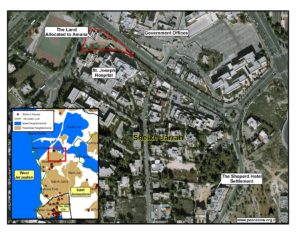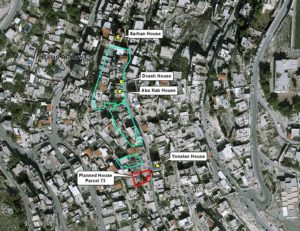These Settlers Got Expropriated Palestinian Plot From the State. Now They Rent it at a Profit

The Amana House: A New Settlement in Shiekh Jarrah
Nir Hasson writes in Haaretz, 3 December 2019, “The Jerusalem Municipality pays nearly 1 million shekels ($224,000) a year to the Amana settlement organization in exchange for operating a welfare department in one floor of an office building that the group bought from the government for that same price.
Amana, whose primary goal is developing new Jewish communities, particularly in the West Bank, received the plot located in East Jerusalem from the government after it was expropriated from a Palestinian family.
The organization paid the state 913,000 shekels ($262,000) for the land in the Sheikh Jarrah neighborhood of East Jerusalem, and now receives the same amount it paid for the entire plot every year in return for renting out only the ground floor.
The organization operates under the Yesha Council, an umbrella organization of Jewish settlements in the West Bank.
Amana is legally a “cooperative association” founded by the Gush Emunim settlement movement in 1979, and is the most important independent body for the establishment of new settlements and the expansion of existing ones in the West Bank. In 2016, two of its senior executives were investigated for corruption, secretary general Ze’ev Hever and treasurer Moshe Yogev.

Palestine family from Sheikh Jarrah appeal eviction order
The land Amana built the office building on is located near Saint Joseph Hospital and the police’s national headquarters in Sheikh Jarrah. It belonged to the Palestinian Abu Ta’ah family, which lives nearby. After the Six-Day War in 1967, the plot included 4,000 dunams (1,000 acres) of land that the government prepared for expropriation in northern Jerusalem – even though the expropriation was never carried out in practice.
In 1993, the government granted Amana a permit to prepare a plan to build the structure, and in 2005 a development agreement was signed between the Israel Lands Authority and the state – in which Amana committed to pay the authority 913,000 shekels in fees to use the land.
But even at this stage, the land still officially belonged to the Abu Ta’ah family, because the expropriation process was never completed – so the land registry refused Amana’s request to register the land in its name.
The family and its lawyer say that in order to allow the expropriation and transfer the land to a private company, the Israel Lands Authority changed the registration of the plots on the site and included the Abu Ta’ah’s family plot in the larger plot for planning that includes the government ministries. Later, then-Finance Minister Yuval Steinitz signed the expropriation order – enabling Amana to continue to advance the project.
In 2016, the Jerusalem District Court denied a petition from the Abu Ta’ah family against the expropriation process and the transfer of the land to Amana. Two years ago, justices of the Supreme Court recommended to the family’s lawyer to withdraw their appeal of the lower court ruling. “What will you achieve? Even if the appeal is accepted, it will only lead to a bit more bureaucracy,” said Supreme Court Justice Isaac Amit at the time.
The construction of the building was completed two years ago and a short time later the city signed an agreement with Amana to rent the ground floor, 713 square meters in size, to establish a welfare office. The office serves the Jewish residents of the northern neighborhoods of Jerusalem: Pisgat Ze’ev, Neveh Yaakov and French Hill – and not the nearby Palestinian neighborhoods of Sheikh Jarrah and Wadi Joz.

site of new settlement house in the heart of Sheikh Jarrah
According to the contract between the city and Amana, the city agreed that the bureau will not provide services to “a public with a criminal nature, including treating drug users, methadone users and/or alcohol users.” In the original agreement in 2018, the city paid 916,000 shekels in rent. In 2019 the city paid 930,000 shekels.
Peace Now, which has been following the status of the building over the years, said this is another one of Amana’s tricks, and the Jerusalem municipality wants to keep it happy. “After it received the land that was expropriated in a dubious process without a tender, Amana is profiting in three ways: It built a luxurious office building for itself in the midst of a Palestinian neighborhood; it also strengthens the settlement it built by bringing in Israeli visitors to the welfare office inside the Palestinian neighborhood; and has treated itself to a nice income of about a million shekels a year at our expense and with the help of state and municipal institutions.”
Amana declined to comment. ” This article is printed in its entirety.
